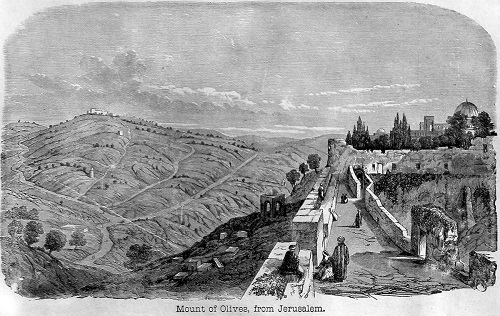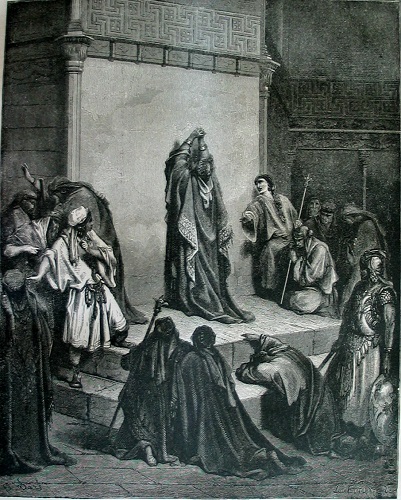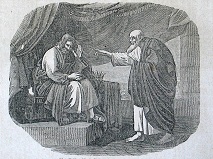Daily Bible Study Tips –
King David, 2 Samuel
1 Samuel
2 Samuel 1:1, 17-27
2 Samuel 5:1-5, 9-10
2 Samuel 6:1-11
2 Samuel 6:12-22 David celebrates the entry of the Ark into Jerusalem
2 Samuel 7:1-26, Nathan prophesies that God will build King David’s house.
2 Samuel 7:1-14
2 Samuel 11:1-15; Psalms 14
2 Samuel 11:26-12:13
2 Samuel 12:1-15, Nathan denounces King David for adultery and murder.
| Random Walk in a Gallery of Religious Art, Step 26: Samuel 15:1-14, 23-31, The Mount of Olives |
| Random Walk in a Gallery of Religious Art, Step 27: 2 Samuel 18:1-17; 18:31 – 19:8, David mourns Absalom |
Copyright information, disclaimers, and sponsors
Return to homepage
2 Samuel 1:1, 17-27
Our Bible is made up of 66 books that the Church has decided are canonical, that is, scripture. The Bible refers to quite a number of other books, most of which are lost to us. The Book of Moses, also called the Book of the Law or the Book of the Covenant, is referred to in many places; we have this one, and we call it Genesis, Exodus, Leviticus, Numbers, and Deuteronomy. Today's passage contains one of two verses that refer to the Book of Jashar. Other books mentioned in the Bible are
- the Book of the Acts of Solomon (1 Kings 11:41);
- the book of the chronicles of the kings of Israel (1 Kings 14:19 and many other places);
- the book of the chronicles of the kings of Judah (1 Kings 14:29 and many other places);
- the books of Samuel the seer (which may be our 1 and 2 Samuel), Nathan the prophet, and Gad the seer (1 Chronicles 29:29);
- the books of Shemaiah the prophet, and of Iddo the seer concerning genealogies (2 Chronicles 12:15, 20:34);
- the books of Nathan the prophet, and the prophecy of Ahijah the Shilonite, and the visions of Iddo the seer (2 Chronicles 9:29);
- the book of the records of thy fathers (Ezra 4:15);
- the book of the chronicles (which may be our 1 and 2 Chronicles) (Nehemiah 12:23);
- the book of the chronicles of the kings of Media and Persia (Esther 10:2); and
- the book of the purchase (Jeremiah 32:12).
These books would be of profound interest to scholars and historians, and probably of
some interest to Christians and Jews, if they turned up. Would they be scripture?
Probably not, because even if they were extremely valuable for spiritual growth, the
entirety of Jewry or the Church would have to agree to canonize them, and that's so
unlikely that I can't even imagine it. The loss of these books shouldn't worry you,
however. Anything that's important to salvation is in the Bible we have.
There's one
more book mentioned in the Bible, and it is important to salvation: the Book of Life.
Rev. 20:12 says "I also saw all the dead people standing in front of that throne.
Every one of them was there, no matter who they had once been. Several books were
opened, and then the book of life was opened. The dead were judged by what those
books said they had done." Make sure your name is written in the Book of Life.
2 Samuel 5:1-5, 9-10
Washington, DC, was built where it is as a compromise between states that wanted the
federal capital in the North, and those that wanted it in the South. (States here in
the West didn't get a vote, because they didn't exist yet.) It may be that our
founding fathers were thinking about David when they came to this compromise.
He had been ruling in Judah for seven years, and now Israel wanted him to be their
king, too. Instead of keeping his capital at Hebron in Judah or moving it to Israel,
he went out and conquered a centrally located fortress on Mt. Zion and made it his
capital. For this reason Jerusalem is also called the City of David.
2 Samuel 6:1-11
Remember that David went out of his way to create a capital city, Jerusalem, that
would be acceptable to both the northern tribes of Israel and the southern tribes of
Judah. Another canny move was to make the political capital the center of worship as
well by bringing the Ark of the Covenant there. This insured that everyone in the
two parts of the country got to rub shoulders on the feast days, and it had the
potential to glue them together in a lasting way. Under Solomon's son, things fell
apart, but we'll learn more about that later.
2 Samuel 6:12-22 David celebrates the entry of the Ark into Jerusalem (3/30/09)
Jerusalem is so important to Judaism and Christianity that we are surprised to learn that originally the city was not part of the kingdom of Israel at all. After David became king over all the tribes of Israel, he astutely went out and captured Jerusalem – creating a neutral capital that had not previously belonged either to the Northern tribes or to the Southern tribes. First he made it his political capital, and then he made it the center of worship by bringing the Ark of the Covenant into the city. The Ark's entry into Jerusalem was a joyous occasion. David danced in front of the Ark wearing, roughly speaking, a loin cloth. He made sacrifices to God every couple of yards along the route and gave gifts to everyone who came to see the triumphal procession. Not everyone was happy. His wife Michal, the daughter of Saul, sneered at him for being undignified. David responded that if celebrating before the Lord is undignified, so be it. He himself would be content with honor from slave girls.
2 Samuel 7:1-26, Nathan prophesies that God will build King David’s house.
Several years passed. Saul died, and David became king over all of Israel. David was devout, charismatic, and politically astute. He executed the man responsible for Saul's death, which gave him some standing with Saul's followers. Next, he went out and captured a foreign city – Jerusalem – and made it the new capital. Jerusalem had no ties to either the southern or northern tribes, and it was more centrally located than his old capital, Hebron. Then he went to Gibeah and brought the Ark of the Covenant to Jerusalem, making that city the center of worship as well. By these actions, he unified the kingdom. In today's passage he gets to thinking that maybe he should build a better "house" for God. At first, Nathan the prophet approves of this plan. Then God says to Nathan, "No, tell David he's not going to build me a house (a temple), I'm going to build him a house (a dynasty)." In addition to his other characteristics, David was a man of great humility. His response to God's message delivered by Nathan shows why David's dynasty, and not Saul's, was in favor with God.
2 Samuel 7:1-14
The writers of the Old Testament delighted in double meanings. David is sitting in
his palace – his house. He thinks, "Wow! This is a great house I've got here, but
the LORD is still in a tent. I can fix that." The prophet Nathan tells David to
build a house for God – a temple. But then God tells Nathan that he doesn't want
David to build him a house; instead, God is going to build
David a house – a dynasty – and David's son will build God's house. David says,
okay, but he's still going to get the men and materials ready, and he does that that
in the chapters following today's reading. We must entrust our futures to God, but
meantime, we can do everything in our power to prepare for the work God wants to be
done by others.
2 Samuel 11:1-15; Psalms 14
Remember the psalm we read a few weeks ago, in which David said he always obeyed
God's law? I commented that he must have been a very young man when he wrote that.
Later he learned that he was just as capable of sin as anyone else – and not any
so-called "little" sin, either, but adultery and murder. In today's psalm he says,
"From heaven the LORD looks down to see if anyone is wise enough to search for him.
But all of them are corrupt; no one does right."
2 Samuel 11:26-12:13
2 Samuel 12:1-15, Nathan denounces King David for adultery and murder.
More years passed, and things went very well for King David. Maybe he got complacent, or maybe he had a weak moment. He had an affair with Bathsheba, the wife of one of his generals, Uriah. When Bathsheba told him that she was pregnant, first David tried to cover it up by getting Uriah home to sleep with her. That didn't work, so David arranged for Uriah to be killed in action, and then he married Bathsheba. Possibly the people were fooled, but God was not. I always used to tell my kids, "If you do something wrong, you always get caught, because at least two people know: you and God." God often tells somebody else, too, like Nathan. At this time, prophets had ready access to the king, so Nathan promptly went to David and told him a story. David was indignant about Nathan's report of the theft of the poor man's sheep, but when Nathan pointed out that David was the thief, how different his reaction was from Saul's! David was forgiven; nevertheless, God won't protect you from the inevitable earthly consequences of your sin. Nathan's prophecy of evil on David's house ultimately came true – one of his sons raped a half-sister, Tamar; Tamar's full brother Absalom murdered the half-brother; and Absalom led a rebellion against David and raped David's concubines on the roof of the palace in plain sight of the people. Through his own sin, David taught his sons about adultery and murder.
Random Walk in a Gallery of Religious Art, Step 26: 2 Samuel 15:1-14, 23-31, The Mount of Olives (4/6/15)
|
Guess what? The Mount of Olives, being a mountain, was in the same place in David’s time that it was in Jesus’ time: just across the Kidron Valley from Jerusalem. Absalom, King David’s third son, was responsible for the murder of his oldest brother, Amnon, and we never hear anything about Chileab, David’s second son, so maybe he died young or something. Absalom felt that he was the logical choice to follow his father David to the throne of the kingdom, but he couldn’t wait. He rebelled against David, and David and his people fled the city of Jerusalem, crossed the Kidron Brook, and went to the Mount of Olives. Our illustration today shows the Mount of Olives from the walls of Jerusalem, probably as it looked in the 19th century. There weren’t many trees there by that time, but try to imagine it covered with trees, as it might have been when David “headed out toward the road that leads to the wilderness.”
Previous Step. Next Step. |
 "Mount of Olives, from Jerusalem" from the Thomas family Bible, now in a private collection of a family member. |
2 Samuel 18:5-15, 31-33
God told David that because of his adultery with Bathsheba and his murder of Uriah, trouble would rise up within his own house. Amnon, David's eldest son, raped his half-sister Tamar, the full sister of Absalom, David's third-born son. Absalom murdered Amnon, and David banned him from the court. Absalom rebelled against the king and plunged the country into civil war. Absalom took his father's concubines on the roof of the palace to ensure that his followers knew there would be no reconciliation with David. David's primary contribution to the leadership of the counter-rebellion was to grieve, "Absalom, Absalom, my son, my son!" Nevertheless, Joab was always ready to spill blood on David's behalf, as we see in this passage. The consequences of sin are inevitable, even if we, like David, repent.
Random Walk in a Gallery of Religious Art, Step 27: 2 Samuel 18:1-17; 18:31 – 19:8, David mourns Absalom (4/7/15)
|
It’s a terrible thing to lose a child, and David was justifiably grieved for his son. Nevertheless, this particular son had alienated the affections of many of his father the king’s people, raped his father’s concubines, and led a rebellion against his father that cost the lives of many soldiers. When David’s soldiers win the war – and kill Absalom in the process – David is so consumed by his grief for his son that he ignores the fact that the soldiers have saved his kingdom and his life by defeating his enemy. Joab straightens him out. Doré shows both David’s grief and the consternation among his men. I have no idea, however, what the structure is that David is leaning against. If it’s meant to be the Temple, that was built a few decades later by King Solomon; if it’s meant to be the Wailing Wall, that was built about 1000 years later by Herod the Great. The artwork we’ve been looking at has, I hope, given us new insights into scripture, but I also hope it’s made us think clearly about whether what’s shown could possibly be what happened. Previous Step. Next Step. |
 "David Mourning Over Absalom" by Gustave Doré, from the Gartin family Bible, now in the private collection of Regina Hunter. |
Copyright 2007, 2008, 2009, 2010, 2011, 2015, 2016 by Regina L. Hunter. All rights reserved.
The woodcut showing Nathan reproving David is from the family Bible of John O. Spencer and Lydia Bunn, married 18 Nov. 1857 in Hector, Schuyler Co., NY. A complete listing of the posted images from this Bible is given at Ducks in a Row, Inc.
Opinions expressed on this page are solely those of the author, Regina Hunter, and may or may not be shared by the sponsors or the Bible-study participants. Thanks to the Holy Spirit for any useful ideas presented here, and thanks to all the readers for their support and enthusiasm. All errors are, of course, the sole responsibility of the author.
Our Sponsors:
St. John's United Methodist Church, "Transforming Lives Through Christ."
2626 Arizona NE, Albuquerque, New Mexico 87110
St. John's Music Ministries now has a YouTube channel, bringing you free concerts and choral music. Check it out!
Traditional worship services are held Sundays at 8:15 and 11:00 a.m. in the sanctuary. Casual worship services are held Sundays at 9:30 a.m. in the Family Life Center. Jazz Vespers are held monthly on the second Saturday at 5:00 p.m. in the sanctuary. St. John's feels especially called to the worship of God and to the service of our neighbors through our music program.
Storm Dragon SoftwareTM
Ducks in a Row, Inc.
This website is supported in part by the generosity of Mrs. J. Jordan.
